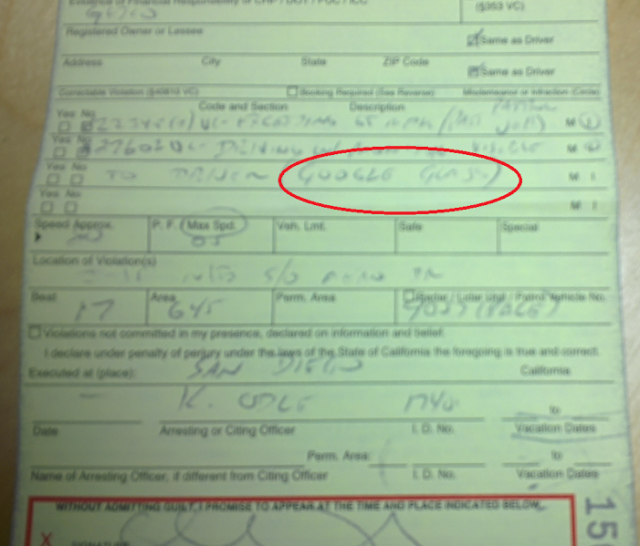A California woman was apparently pulled over and given a ticket for driving while wearing Google Glass last night. Cecilia Abadie took to Google+ to post a picture of the ticket she received in San Diego, which says she was guilty of "Driving with Monitor visible to Driver (Google Glass)."

The police officer cited a California law stating that "[a] person shall not drive a motor vehicle if a television receiver, a video monitor, or a television or video screen, or any other similar means of visually displaying a television broadcast or video signal that produces entertainment or business applications, is operating and is located in the motor vehicle at a point forward of the back of the driver’s seat, or is operating and the monitor, screen, or display is visible to the driver while driving the motor vehicle."
Abadie was also cited for speeding. The officer may have noticed that she was wearing Google Glass after pulling her over and decided to add a second infraction.
However, Abadie may have good cause to fight the Glass-related portion of the citation. The California rule provides exceptions for video equipment if it provides a "global positioning display" or "mapping display." Google Glass can of course be used as a GPS. A California driver handbook summarizes the rule and its exceptions by saying, "Do not drive a vehicle equipped with a video monitor, if the monitor is visible to the driver and displays anything other than vehicle information global mapping displays, external media player (MP3), or satellite radio information."
Abadie's post has garnered more than 200 comments, with one person calling the law "amazingly ambiguous."
"Please please please, fight this in court. We need to get a ruling on this," the commenter said.
Abadie seems inclined to fight the ticket. "It's all in how a judge will interpret it and I suspect their love or hate and understanding of the technology might help or the opposite," she wrote.
reader comments
290